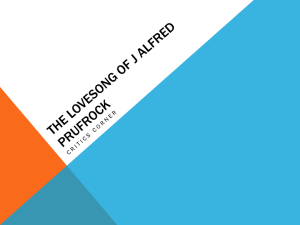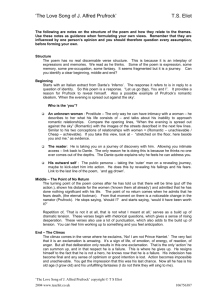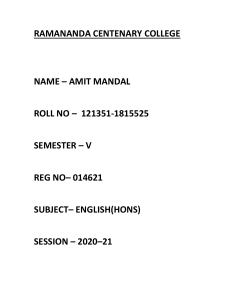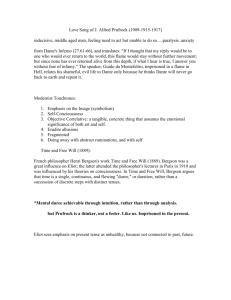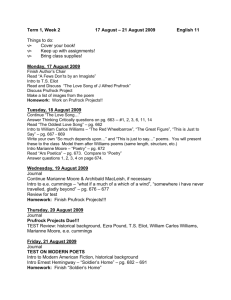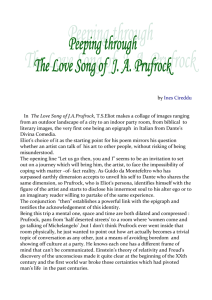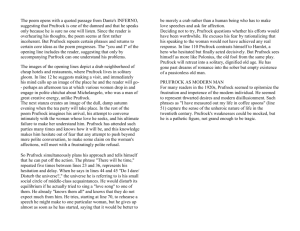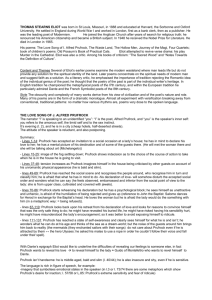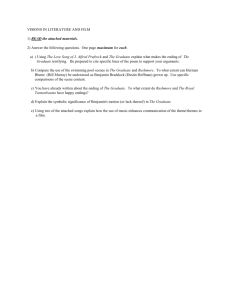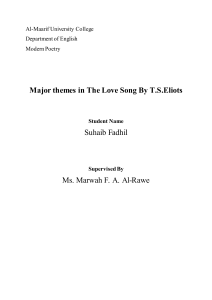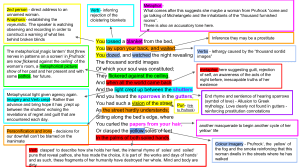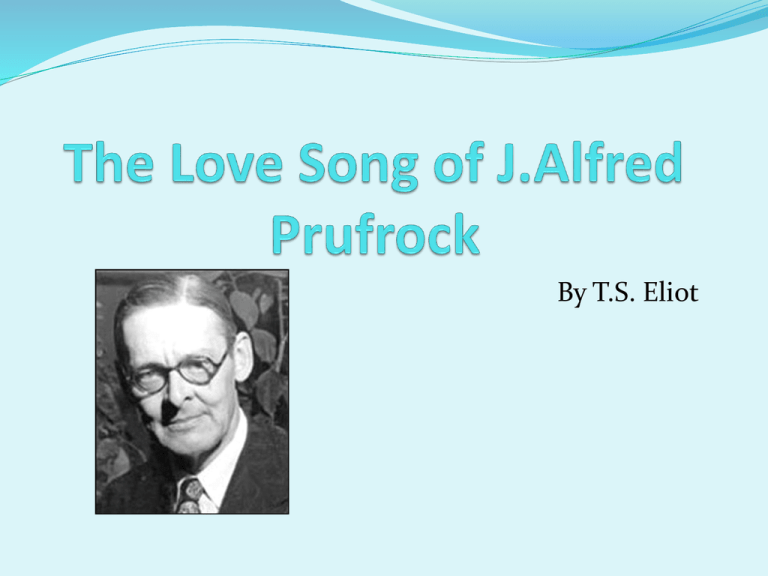
By T.S. Eliot
Published in 1915, Prufrock is an examination of the
prototypical modern man. Prufrock is over-educated,
eloquent and emotionally stilted.
Prufrock addresses the ‘You and I’ (the audience)
about his potential lover and forcing a moment to “it’s
crisis”.
Prufrock knows too much about life and its inevitable
disappointments to ‘dare’ approach the woman.
In his mind he hears the comments others make about
his perceived inadequacies- his receding hair line, his
thin arms etc…
Format
The poem is delivered as a dramatic monologue, a
fictional speech from a fictional character, much like a
soliloquy in a play
1: The poem is a specific utterance of an individual
(Prufrock)
2: It is directed to an inferred listener (us)
3: The focus is the revelation of the speakers character
The ‘Epigraph’ from Dante’s Inferno describes his ideal
listener: someone who will hear his woes but never
repeat them. The listener is unable to repeat them
because they are dead and trapped in hell.
Rhyme Scheme-
Conclusion
The rhyme is irregular but
not random! The
scheme is carefully
constructed with the use
of refrains“In the room….
“How should I presume?...
“That is not it all…”
The conclusion is a
comparison to
Shakepeare’s Hamlet and
the idea of a tragic hero.
That rather than being a
hero, he is insignificant,
‘Fifth Business’ in his
own life!
Prufrock Analysis
Epigram: is Dante’s
Inferno- the audience of
like-minded individuals
who will never tell of his
insecurity and secrets.
You!
1: The invitation: “you
and I”
A metaphorical
invitation to walk the
dark streets- lonely and
isolated.
“patient etherized”
Seduced/medicated and
Refrain:
easy to control!
Women are
modern/intellectual and
independent
“One night hotels”
“insidious intent”
“overwhelming question”
SORDID sexual
encounters, where is he
taking you? It is implied
that you understand!
“yellow Fog”
Is cat like, alienated and
vulnerable, like a ‘stray’
in society
“There will be time”
Why do it now when it
can be done laterprocrastination!
“faces”
Masks that disguise his
true feelings!
“taking of toast and tea”
In polite society he feels a
misfit.
“Do I dare?”
Insecure imaginings of
how they talk about him.
He has to make a choicehe is insecure and
cowardly
“Known them all”
Measured and considered,
a contrast to the above!
“sprawling on a pin”
“shall I say”
“I should have been a
crab, scuttling…”
Like a bug being
studied/exhibited.
Should he talk about his
exploits, will they listen
or laugh and think him
crazy?
This is true vision of
himself, a ‘bottom
feeder’ walking the
floors of the ocean.
“…force the moment to its
crisis…”
“..platter…”
Should he act, is it worth
it?
Biblical allusion, John the
Baptist’s head, brought to
Herod’s wife (at her
request) on a silver platter!
“eternal footman..”
Judgment- how will he be
received at the gates of
heaven?
“I am Lazarus..”
The OT Biblical story of
Lazarus and Dives.
Lazarus came back to
warn the people and no
one would listen.
“Prince Hamlet”
What is his role in his
own life? Key actor or
support or comic relief?
“I grow old..”
Images of old age, rolled
“mermaids”
trousers, eating a peachno teeth!
Enticing sailors to their
death on the rocks- they
sing to all but him, he is
not worthy!
The title is ironic, this is not a love song, but for
Prufrock we feel pity and angst. The modern man of
the 1920’s is not heroic, in fact they are the opposite, a
reaction to the events of WW1.
You may mock his weakness as today’s standards
contrast his ideas, but as a representative of the
‘emerging modern-man’ we see Prufrock as pathetic,
not tragic.
We see a life not lived, paralleling characters in works
like:
The Woman in This Poem. Bronwen Wallace
The Great Gatsby. F Scott Fitzgerald
The Hollow Men. T S Eliot
Death of a Salesman. Arthur Miller

